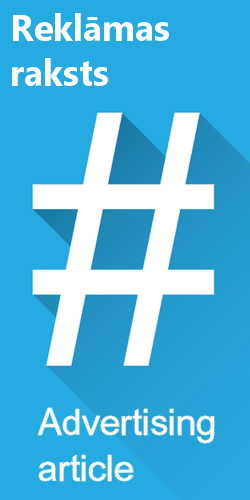Autors: Rolands Petersons
Avots: Rolands Petersons
Rolands Petersons (Latvia), Member of the Board of Norman Logistics GmbH
The new
European Parliament and its approved European Commission shall quickly and
inevitably return to the politically unpleasant issue. It is the idea publicly
advocated by present leaders of France and Germany - to establish “European
champions”, the transnational super-enterprises. Yes, possibly, even the EU
scale monopolists of their industry.
Reklāma

Europe needs
its industrial giants that could successfully participate in the global
competition with the USA or Chinese corporations. To decide on the formation of
such "monsters" – for many European politicians or economy
theoreticians it might mean to destroy their ideological principles themselves.
It does not matter, whether it is confidence in "laisez faire"
or in the economy determined by national policy within the framework of one
country.
However, the
reality is too strict to be ignored. The USA has taken the path of aggressive
protectionism, and this mood will just continue increasing alongside with the
approach of campaign for the presidential elections in 2020. However, it is
almost an obligatory reaction of Washington to the precise and successful
global expansion policy of China. Neither the EU, nor even “the free/Western
world” sets the laws of global economy. World Trade Organization cannot
regulate anything anymore. We must be ready to compete efficiently under the
market circumstances, when everything is allowed. Unfortunately, still many
European politicians and economists are too stubborn to understand this. Other
countries perceive the initiatives of Germany and France with jealousy, viewing
them only as danger to their industries.
The situation
was brilliantly described by leader of Euro-liberals Guy Verhofstadt, pointing
out that in the future there will be empires dominating – China, India, Russia,
USA, and warning that “the clock is already ticking” for the ambitions of the
EU to remain among the global leaders. We must not trivialize this already paradigmatic
assessment – in its turn, to speak about it ironically would be a
self-assertive mistake.
Therefore the
governments of the Baltic and Central-/Eastern European EU Member States should
find sufficient political will and rationalism in order to support consequently
the offer of Germany for the new EU strategy in the industry development. After
all, this position is based on the rich global competition experience amassed
by Germans within the period of at least one hundred and fifty years. The
countries, whose business has already cooperated with the economy of Germany, view
such position as fully self-evident.
Baiba Savrina (Šavriņa), Professor of the University of
Latvia, researcher of global economy, told to the local mass media: the Baltic and
Eastern European countries should hardly worry, what cumbersome consequences,
for example, their automotive industry would face due to the creation of an
export-oriented industry “champion” with the roots in German and French
enterprises. For the entrepreneurs of other countries this will mean broader
engagement in supply chains, additional orders of components or equipment, as
well as the additional demand for their offered goods or services in German
market.
The Professor
agrees to the statement that other countries may safely rely on the experience
and strategic offer of Germany. The motive which could be always clearly heard
during the political discussions of this country is the responsibility for the
growth of all European economy and welfare. In its turn, France already has
lengthy and diverse national scale experience of “the formation of champions” –
including the nationalization of enterprises performed by socialist governments
during the 1980ies. Therefore in Paris everybody is well aware of both
advantages and all shadows and failures of such process, emphasizes Baiba Savrina
(Šavriņa).
However, in the
Baltic States, such correct measure may become a great venture. Although the
government of Latvia has advocated for “softening” of the EU antimonopoly
policy by adjusting it to global reality. May be this measure might be even not
taken. According to the point of view of our society and politicians, Germany –
and its true economic influence on this region –, unfortunately, are
considerably mentally disassociated, “directly not perceptible” abstraction,
while Nordic countries, especially Sweden, have powerful influence on the
Baltics. Scandinavians and Finns, in relation to the future of their industry,
may have both national ambitions and sentiments – and among them also jealousy
regarding the dominance of Germany and France. Due to their desire to integrate
more with the Nordic countries, three Baltic States might choose to support such
EU economic strategy, which is based on the yesterday’s arrogance and leads to
dead end.
About
the company
Norman Logistics GmbH is based in Dortmund, Germany.
This company operates in Europe and also in many other major logistics centers
in the world. The core business is a cargo brokerage, mainly marine cargo.
Norman Logistics customers are significant EU companies which his production
transport throughout marine cargo. And service providers are medium or large
shipping companies. The mission of Norman Logistics is convenient logistics and
one point service for the same price, individual and best quality approach.
Par rakstu pārpublicēšanas noteikumiem lūdzam kontaktēties ar Travelnews.lv redakciju.
 --------
--------









